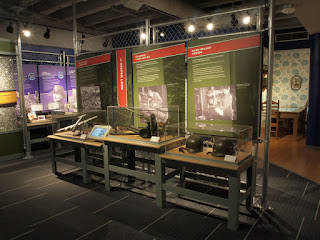My spouse and I visited the Detroit Historical Museum (DHM) on
a Sunday afternoon in early July 2017. Incredibly, admission to the museum is free!
(Donations are accepted, of course.) It is open Tuesdays through Fridays from
9:30 am to 4:00 pm and on Saturdays and Sundays from 10:00 am to 5:00 pm (closed
on Mondays). We spent about two hours at the museum, moving through each
exhibit at a brisk pace, but you could easily spend an entire day if you want
to fully investigate each exhibit and item on display.
The DHM is located in Detroit’s Cultural/Historic District
on Woodward Avenue, across a side street from the main branch of the Detroit
Public Library and diagonally across the street from the Detroit Institute of
the Arts (DIA). (The science center and African-American museum are nearby.) Parking
is available for a fee in an adjacent surface lot. The museum exhibits cover
several floors, with both stairs and elevator access between them. The DHM
offers amenities including restrooms, an information desk, and a shop that
sells souvenirs, gifts, and snacks. (The museum contains no on-site restaurant,
although a lunchroom is available if you “brown bag” it.)
The museum’s goal
is to illustrate the history of the area from the 1700s to present day. Exhibit
themes include automobiles and the assembly line, famous Detroit natives and their
inventions (also check out famous handprints outdoors in the courtyard from
Alice Cooper, Gordie Howe, Martha Reeves, Mary Wilson, and Lily Tomlin, among
others), the city’s role in World War II, colonial times and the fur trade,
slavery and the Underground Railroad, model trains, Kid Rock Music Lab, and
rotating exhibits. Our favorite part of the museum was called the “Streets of
Old Detroit”; located in the basement, it recreates a village from the 19th
and early 20th century (complete with cobblestone streets,
storefront windows, and shops that you can enter). We also liked the “Motor
City Exhibition” area, particularly its re-creation of an automobile assembly
line (including a two-story “body drop” of a car exterior onto a frame). The semi-interactive
toy train exhibit was also particularly enjoyable. (The cable car feature is not
one that we have noticed before, nor had we ever seen how a tiny camera can be
attached to one of the engines to give a close-up view of the train’s path.) We
were also intrigued by the temporary exhibit that described the Detroit riots
of 1967, which are coincidentally chronicled in a major motion picture that
opened in August 2017.
We enjoyed our
time at the Detroit Historical Museum – and we would have gladly paid for the
experience!












